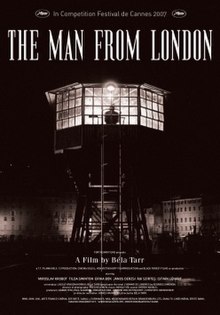The Man from London
| The Man from London | |
|---|---|

Theatrical release poster
|
|
| Directed by |
Béla Tarr Ágnes Hranitzky |
| Produced by |
Humbert Balsan Christoph Hahnheiser Juliusz Kossakowski (executive producer) Paul Saadoun Gábor Téni Joachim von Vietinghoff Miriam Zachar |
| Written by |
Georges Simenon (novel) Béla Tarr László Krasznahorkai |
| Starring | Miroslav Krobot Tilda Swinton Janos Derzsi Istvan Lenart |
| Music by | Mihály Vig |
| Cinematography | Fred Kelemen |
| Edited by | Ágnes Hranitzky |
|
Production
company |
|
| Distributed by |
Fortissimo Films Artificial Eye IFC Films |
|
Release date
|
|
|
Running time
|
139 minutes |
| Country | Hungary France Germany |
| Language |
English French |
| Budget | €4.3 million |
The Man from London (Hungarian: A londoni férfi) is a 2007 Hungarian film directed by Béla Tarr and Ágnes Hranitzky. It is an adaptation by Tarr and his collaborator-friend László Krasznahorkai of the 1934 French language novel L'Homme de Londres by prolific Belgian writer Georges Simenon. The film was co-directed by editor Ágnes Hranitzky, and features an international ensemble cast including Czech actor Miroslav Krobot, Tilda Swinton, and Hungarian actors János Derzsi and István Lénárt. The plot follows Maloin, a nondescript railway worker who recovers a briefcase containing a significant amount of money from the scene of a murder to which he is the only witness. Wracked by guilt and fear of being discovered, Maloin sinks into despondence and frustration, which leads to acrimony in his household. Meanwhile, an English police detective investigates the disappearance of the money and the unscrupulous characters connected to the crime.
The French, German and Hungarian co-production of the film was fraught with difficulty and obstacles. The first of these was the suicide in February 2005, days before shooting was due to begin, of the film's French producer, Humbert Balsan. As the original financing of the film collapsed, the remaining producers managed to secure stop-gap funding which allowed them to shoot nine days of footage on the expensive Corsican sets, until they were shut down through legal action by the local subcontractor. After many expressions of support from European film organisations, production companies and government bodies, a new co-production contract was signed in July 2005 with a revised budget and shooting schedule. It then emerged that all rights to the film had been ceded to a French bank under the original production agreement, and only after further changes in the film's backers was a deal struck with the bank to allow shooting to resume in March 2006, over a year later than had been originally envisaged.
...
Wikipedia
